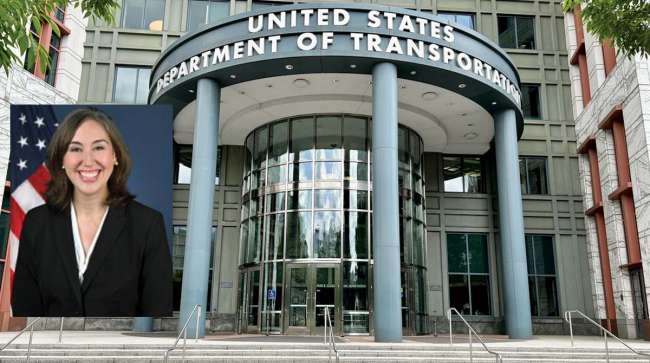Senior Reporter
USDOT Aims to Grow FLOW

[Stay on top of transportation news: Get TTNews in your inbox.]
Nearly two years after an information-sharing forum designed to improve communication among freight stakeholders was launched, its new director expects it will continue to grow.
While promoting the Freight Logistics Optimization Works, or FLOW, forum’s potential benefits, Deputy Assistant Secretary Allison Dane Camden expressed confidence about its long-term capabilities. Established as a tool to help stakeholders respond to disruptive freight bottlenecks at commercial ports of entry, the U.S. Department of Transportation anticipates FLOW will expand over the coming years.
“We’re looking to grow FLOW in 2024,” Camden told Transport Topics during a recent interview. “That’s a data-sharing partnership with the private sector that’s really meant to enable the participating companies that are working with us to anticipate changes in the supply chain and help inform their decision-making.”
Last fall, as part of the launch of the department’s Office of Multimodal Freight Infrastructure and Policy, Camden took on the role of overseeing the FLOW forum in partnership with the Bureau of Transportation Statistics. The new multimodal office is assigned with helping to maintain efficiency at freight networks and commercial supply chains. FLOW is central to the office’s mission.
“It’s really a partnership with ocean carriers, ports, motor carriers, other supply chain partners to help better predict changing cargo demand before it hits our shores. So this can help us to identify and then avoid bottlenecks; create a more resilient supply chain,” Camden said Feb. 8.
“Something that we saw during the supply chain crisis was you had a lot of these individual actors throughout the international supply chain making their own decisions about, you know, what they were shipping and when and what modes they were using and what equipment they needed,” she went on. “But they were making those decisions without understanding the decisions of everybody else in that supply chain. And so this is an innovative data exchange platform.”
During the height of the COVID-19 pandemic, aspects of the freight industry and supply chain connectivity sector experienced various degrees of disruption. Bottlenecks at commercial ports were partly attributed to interoperability inadequacies. FLOW’s data-sharing applications originate from its volunteer members. Stakeholders are asked to evaluate FLOW’s analyses to further pursue interoperability across supply chain operations.
As she put it, “We have motor carrier FLOW members that are sharing their available trucks to move cargo. So that we can look at the data and see how many trucks are available on a given day to move containers at a member port. So collectively as this government industry partnership, it’s going to help us preview and prevent supply chain bottlenecks. That’s the goal.”
We're proud to appoint Allison Dane Camden to head the department's new Multimodal Freight Office. In Allison's new role, she will lead President Biden's efforts to strengthen our nation's supply chains—making them more resilient for the future. https://t.co/5EpgGxdzWq — U.S. Department of Transportation (@USDOT) December 4, 2023
Camden explained that FLOW permits the department with the Bureau of Transportation Statistics to anonymize samples of proprietary data. DOT officials then showcase anonymized information to help inform decision-making.
“I see it as being here to stay,” Camden emphasized, when asked about FLOW’s likely longevity. “I cannot speak for future administrations and future, you know, what future congresses might choose to do. But it is, you know, it’s new but we have a real ability here to really move the needle on the efficiency of the supply chain.”
Prior to her senior role at DOT, Camden was most recently with the Washington State Department of Transportation. Before that assignment, she worked on Capitol Hill providing professional expertise at the House Transportation and Infrastructure Committee.
The Biden administration launched FLOW in 2022. The program was promoted as a first-of-its-kind tool for developing shared data for companies to “proactively address supply chain challenges via a forward-looking, integrated view of container volumes and equipment” nationwide, according to background information the department provided.
FLOW’s data is analyzed by the Bureau of Transportation Statistics’ suite of programs. Per the bureau’s “Transportation Statistics Annual Report 2023” published in December: “Experience with the FLOW initiative should provide opportunities to create comprehensive statistics on timeliness, reliability or cost of freight movement beyond ports to the entire freight system.”
FLOW motor carrier members include: C&K, Gulf Winds, IMC Companies, NFI Industries, RoadOne and Werner. Other members include: Century Supply Chain Solutions, CH Robinson, DHL, FedEx, Gemini Shippers, STG Logistics and UPS.
Want more news? Listen to today's daily briefing above or go here for more info
“Since President [Joe] Biden took office we have focused on supply chain improvements, not just to recover from pandemic-driven disruptions but also to make lasting improvements for a stronger and more resilient future,” Transportation Secretary Pete Buttigieg said in November, pointing to supply chain-centric funding provided by the $1.2 trillion bipartisan infrastructure law.
The Infrastructure Investment and Jobs Act prioritizes investments for ports, last-mile corridors and other aspects of the freight supply chain. “Our new Multimodal Freight Office,” Buttigieg observed, “will lead coordination of our work to strengthen supply chains — including the FLOW data initiative helping companies and ports make better-informed decisions — so that they can move goods more efficiently and keep costs down for Americans.”




